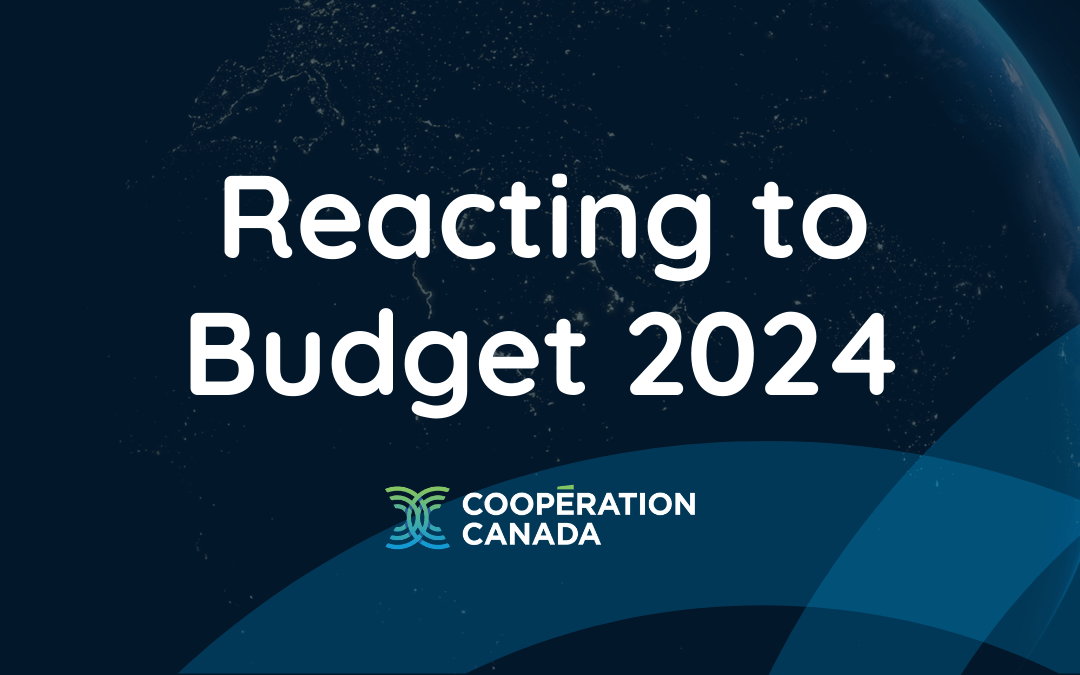
by Cooperation Canada | Apr 19, 2024 | Finance, News
What’s the topline response?
The Canadian Federal Budget 2024 was published on 16 April 2024. For months, the Canadian international cooperation sector has been working together to collectively advocate for new international assistance commitments in Budget 2024, including through our Open Letter to Prime Minister Trudeau, our advocacy on Parliament Hill during International Development Week 2024 and our 2024 Budget Submission.
On balance, Budget 2024 was positive news for Canadian leadership on international cooperation. The budget included $350 million of new and additional humanitarian assistance funding over two years ($150 million in 2024-25 and $200 million in 2025-26). At a time when humanitarian needs are surging around the world, decades of progress on development are under threat, and other donor countries are cutting aid, this influx of new funds is very welcome.
In partnership with CanWaCH, Bigger Than Our Borders, and other coalitions and organizations, we issued a joint statement in reaction to the budget. A sincere thank you to over 100 organizations, from our membership and beyond, that signed onto our collective statement. We have also been pleased to see some pick-up in the media, including by CBC, CTV and La Presse.
What’s in the budget on international assistance?
While the budget did not include all that we pushed for in our advocacy, we recognize the challenging domestic economic context in Canada right now, and welcomed the government’s commitment to step up on the global stage. We hope that this $350 million of new and additional humanitarian assistance funding will support Canadian organizations to work with partners in some of the most challenging humanitarian crises around the world, including the Middle East, Haiti, Sudan, Yemen and the Sahel.
Other relevant funding items for international cooperation included:
- $216.7 million over five years, starting in 2025-26, for Canada’s share of the European Bank for Reconstruction and Development’s (EBRD) general capital increase for Ukraine’s reconstruction.
- $159.1 million over five years, starting in 2024-25, with $5.9 million in remaining amortization, to support Global Affairs Canada’s transformation.
- A recommitment of $10 million per year by 2025 in support of global LGBTIQ rights international assistance programming.
- An estimated $146.3 million over five years, starting in 2027-28, to purchase Canada’s allocated shares in IDB Invest which will catalyze private sector financing to support economic opportunities for women in Latin America and the Caribbean.
- $81 million for 2024-25 to prepare for Canada’s 2025 G7 Presidency (some of which we hope can support engagement with civil society on the priorities of Canada’s Presidency).
Eyeing non-monetary announcements, the budget contained references to the importance of modernizing and investing in international financial institutions, including the introduction of legislative amendments in Canada to better enable hybrid capital and other forms of innovative finance to be leveraged in support of the financing needs of developing countries. It also mentioned a new phase of the International Assistance Innovation Program (IAIP), focusing on small, high impact transactions. We look forward to working with the government on the design and implementation of this program.
What was missing in Budget 2024?
Budget transparency! While the last few years saw a presentation of rough estimates of the total amount for International Assistance Envelope (IAE), this year’s budget document does not even attempt at providing a figure. With no information on trends in the budget baseline, sectoral or spending-type breakdowns, or multi-year forward spending plans, it is difficult to know whether the aid budget is increasing or decreasing, and what lies ahead for the Canadian international assistance budget. We were left to guess what the total IAE budget is for this year – and it has been “guesstimated” at around $7.2 billion per year. If this is the case, it would mean that the IAE budget has grown by about 5% from last year’s $6.89 billion.
We have also been advocating that international assistance to Ukraine be additional to stable or growing assistance to the rest of the world, and to track international assistance investments that respond to the war in Ukraine by launching a Ukraine or Eastern European Assistance Tracker. No commitment was made to this.
Finally, while the focus of this budget was on life-saving humanitarian assistance which is sorely needed right now, Budget 2024 did not provide any increase to longer-term development assistance – investments in programs and partnerships that support a safer, fairer and more sustainable world.
Looking ahead to 2025!
As we look towards Canada’s G7 Presidency in 2025, we will be looking to the government to work with others to leverage bold global commitments in support of international cooperation. Coming off a relatively positive budget cycle, where we saw new funding for international assistance in a difficult fiscal context, it will very be soon time to pitch our priorities for Budget 2025 and Canada’s G7 Presidency. Cooperation Canada looks forward to working with our members on this important advocacy!
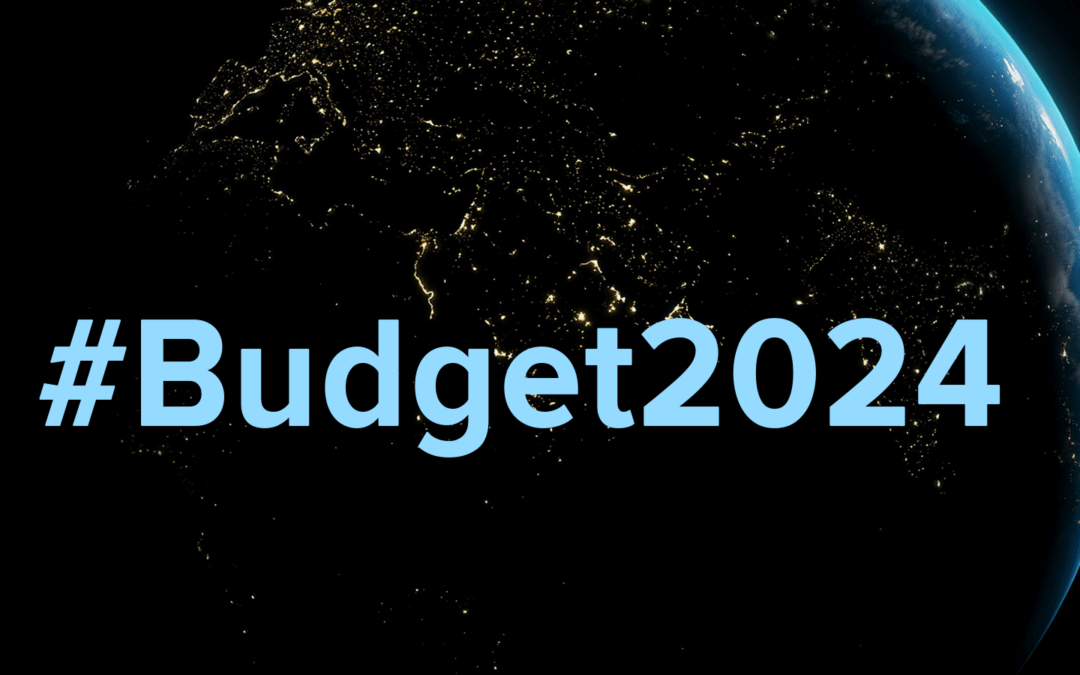
by Cooperation Canada | Apr 16, 2024 | Finance, News, Statement
Ottawa, April 16, 2024 A coalition of Canadian international cooperation organizations welcomes new funding for humanitarian programs committed as part of Federal Budget 2024. The coalition recognizes that this new investment comes in a complex economic environment for Canada and emphasizes the need for the government to continue to play its part on the global stage.
With today’s announcement of $350 million over two years in additional humanitarian aid, the government is taking an important step toward addressing some of the most pressing global needs. This additional funding to the International Assistance Envelope (IAE) has the potential to go towards addressing some of the world’s most devastating crises, including the war in the Middle East, internal chaos in Haiti, civil unrest in Sudan, and crises in Yemen and the Sahel.
As the international community grapples with unprecedented challenges, the Canadian aid sector remains steadfast in its commitment to alleviating suffering and advancing progress across the globe. The coalition, led by the Bigger Than Our Borders campaign, Cooperation Canada, Canadian Partnership for Women and Children’s Health (CanWaCH) and other advocacy groups, pledges to continue advocating for a robust commitment to international assistance as Canada is slated to host the Group of Seven (G7) countries next year. We encourage the government to use the upcoming G7 Presidency to further demonstrate its leadership by engaging other nations towards reversing the global decline in official development assistance.
“This budget is addressing one of the most urgent situations right now globally: the desperate situation for millions of people suffering from humanitarian crises and conflicts. From Gaza to Sudan, Haiti to Yemen, humanitarian needs are surging and decades of progress on development are perilously under threat. We welcome this investment in humanitarian aid, and look forward to further critical investments in long-term development assistance”, said Kate Higgins, Cooperation Canada’s CEO, representing over 100 Canadian international development and humanitarian organizations. “Aligned with Canada’s Feminist International Assistance Policy, this investment will support life-saving programs in communities in crisis, while also supporting global security and prosperity for Canada.”
The international cooperation sector also welcomes that Budget 2024 makes new commitments to enhance Canadian engagement with international financial institutions to make them more responsive to emerging global threats. The budget also points to future initiatives that will seek to catalyze private and philanthropic sources of funding in support of international assistance.
“Canadians expect their government to invest in the long-term safety and security of the country. In a world order distorted by conflict and crisis, Canada is being called on to find global pathways to peace. We celebrate today’s investment in humanitarian aid that will reach and support women and children in their most vulnerable moments through high impact interventions that save lives and help children reach their full potential,” said Julia Anderson, CEO of the Canadian Partnership for Women and Children’s Health.
About Cooperation Canada
Since 1968, Cooperation Canada has brought together Canadian civil society organizations working in international development and humanitarian assistance. With over 100 members, we work with partners in Canada and around the world to build a fairer, safer and more sustainable world.
About Bigger Than Our Borders
Bigger than our Borders is a compelling campaign backed by NGOs that aims to drive the Canadian government towards a significant boost in foreign aid funding. With our deep commitment since 2018, Bigger than Our Borders unites with a collective of NGOs and philanthropic institutions to advocate for the government’s increased contribution to international assistance, ensuring that it meets its responsibility and increases the current funding levels.
About the Canadian Partnership for Women and Children’s Health (CanWaCH)
The Canadian Partnership for Women and Children’s Health (CanWaCH) is a proud membership of more than 100 non-governmental organizations, academic institutions, health professional associations and private sector entities partnering to advance women and children’s health and rights around the globe.
Contact Information:
Louis Belanger – Bigger Than Our Borders 613-265-4417 / [email protected]
Gabriel Karasz-Perriau – Cooperation Canada 514-945-0309 / [email protected]
Megan Aikens – CanWaCH 613-504-2862 / [email protected]
Note: The coalition of aid agencies represents a broad group of organizations working in the fields of advocacy, education, economic development, gender equality and women’s rights, women’s and children’s health, sustainable livelihoods, food and water security, nutrition, human rights and good governance, all who work for a safer, fairer and more sustainable world.
The group includes:
Cooperation Canada / Coopération Canada
Canadian Partnership for Women and Children’s Health (CanWaCH) / Le Partenariat canadien pour la santé des femmes et des enfants (CanSFE)
Bigger than our Borders / Au-delà de nos frontières
Acted Canada
Action Against Hunger Canada
Action Canada for Sexual Health and Rights
ADRA Canada
Alberta Council for Global Cooperation
Association québécoise des organismes de coopération international (AQOCI)
Atlantic Council for International Cooperation
CAMFED Canada
Canadian Association for Global Health
Canada International Scientific Exchange Program (CISEPO)
Canadian Association of Midwives (CAM/ACSF)
Canadian Center for Women Empowerment
Canadian Feed The Children
Canadian Foodgrains Bank
Canadian Lutheran World Relief
Canadian Physicians for Aid and Relief (CPAR)
Canadian Network for Neglected Tropical Diseases
CARE Canada
CAWST
CDF Canada
Centre D’Étude et de Coopération Internationale (CECI)
Change for Children
ChildCare International
Children Believe
Climate Action Network Canada (CAN-Rac)
Coady Institute
CODE
Collaboration Santé Internationale
Compassion Canada
Crossroads International
Cuso International
Development and Peace ― Caritas Canada
Développement international Desjardins (DID)
Effect Hope (The Leprosy Mission Canada)
End Female Genital Mutilation (FGM) Canada Network
Equality Fund
Equitas-International Centre for Human Rights Education
Farm Radio International
Food for the Hungry Canada
Global Citizen
Grandmothers Advocacy Network
Habitat for Humanity Canada
Health Partners International Canada
HelpAge Canada
Hope and Healing International
HOPE International Development Agency
Humanitarian Coalition
Humanity & Inclusion Canada
Hungry For Life International
International Council of AIDS Service Organizations (ICASO)
International Development and Relief Foundation (IDRF)
International Development Enterprises (iDE) Canada
Islamic Relief Canada
Jane Goodall Institute of Canada
Journalists for Human Rights (JHR)
KAIROS: Canadian Ecumenical Justice Initiatives
Kentro Christian Network
Lawyers Without Borders Canada / Avocats sans frontières Canada
Manitoba Council for International Cooperation
Maternal and Infant Health Canada
Maternity Today
Médecins du Monde Canada
Mennonite Central Committee Canada
Mennonite Economic Development Associates (MEDA)
Mission inclusion
Never Again International – Canada
Northern Council for Global Cooperation
Nutrition International
ONE Canada
One Drop Foundation
Ontario Council for International Cooperation
Orbis Canada
Oxfam Canada
Oxfam-Québec
Partners In Health Canada
Plan International Canada
Presbyterian World Service & Development
Results Canada
Right To Play International
Salanga
Santé Monde
Saskatchewan Council for International Cooperation
Save the Children Canada
SeedChange
Seva Canada
SOCODEVI
SOS Children’s Villages Canada
Trade Facilitation Office (TFO) Canada
UPA Développement international
Veterinarians without Borders Canada
VIDEA
WaterAid Canada
The Primate’s World Relief and Development Fund (PWRDF)
The Wellspring Foundation for Education
Women’s Global Health Innovations – Bfree Cup
World Accord International Development Agency
World Renew
World University Service of Canada (WUSC)
World Vision Canada
ZMQ Global
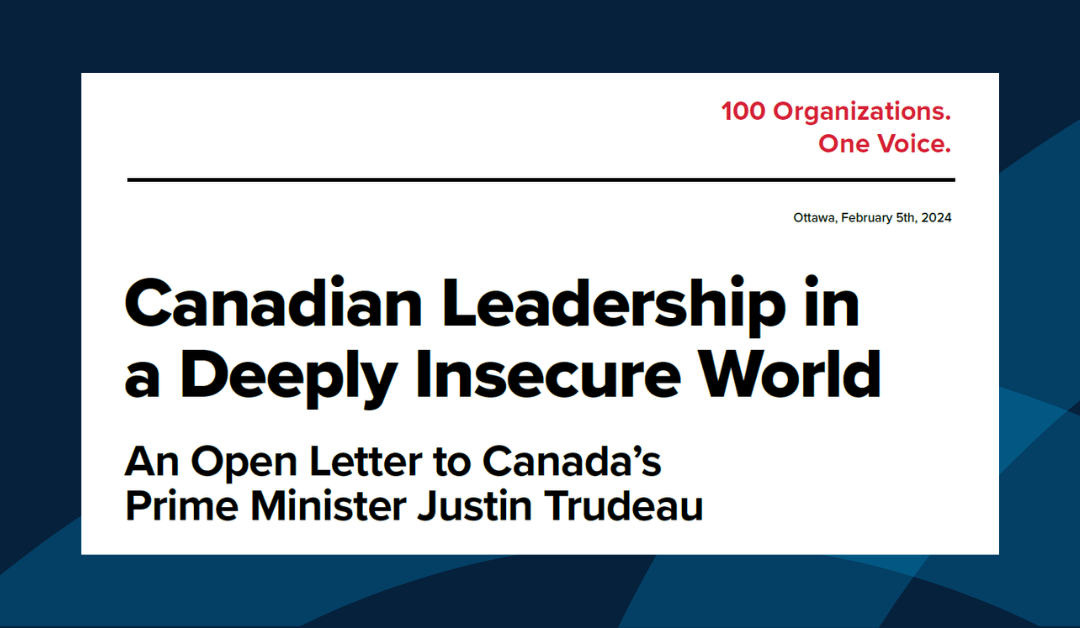
by Cooperation Canada | Feb 5, 2024 | Finance, News
Cooperation Canada stands with over 100 Canadian Civil society organizations calling on the government of Canada to play a leading world in a deeply insecure world.
Read our Open Letter to Prime Minister Justin Trudeau ahead of the 2024 federal budget.
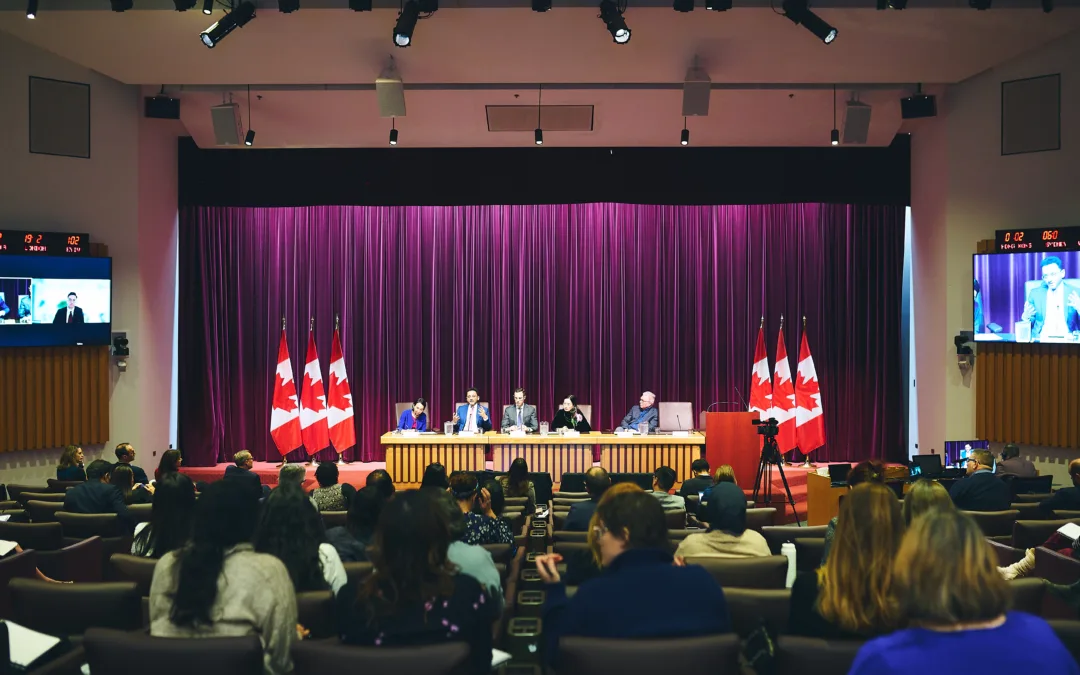
by Gabriel Karasz-Perriau | Jan 31, 2024 | Finance, News
On January 15, 2024, Cooperation Canada collaborated with Global Affairs Canada in organizing a public consultation on Canada’s Indo-Pacific Strategy (IPS) launched in November 2022. The consultation’s objectives were to raise awareness on the Strategy, mobilize the Canadian civil society in its implementation and facilitate meaningful dialogue, and prepare subsequent regional events. The event brought together about 80 participants within the walls of Global Affairs Canada and an additional 124 online from the development, philanthropic, business, government and diplomatic sectors.
After the opening note by Kate Higgins, CEO of Cooperation Canada, the keynote remarks by Associate Deputy Minister of Foreign Affairs, Christopher MacLennan, and panel discussion allowed participants to grasp both the critical importance of the Indo-Pacific region for Canada and the role that Canadian actors can play in that complex geopolitical environment. Mr. MacLennan set the scene, presenting the Strategy as an integrated approach to expand Canada’s presence and strengthen partnerships in the region to effectively protect and promote Canadian interests. He observed that the rise of the Indo-Pacific can generate significant local benefits and drive economic growth across Canada. The Deputy Minister also acknowledged the importance of civil society organizations the implementation of the IPS, noting that many of them are expecting feedback on their submission to the 2023 call for concept notes to enhance inclusive governance, promote and protect human rights, and advance gender equality in support of sustainable and inclusive economic growth in the Indo-Pacific region.
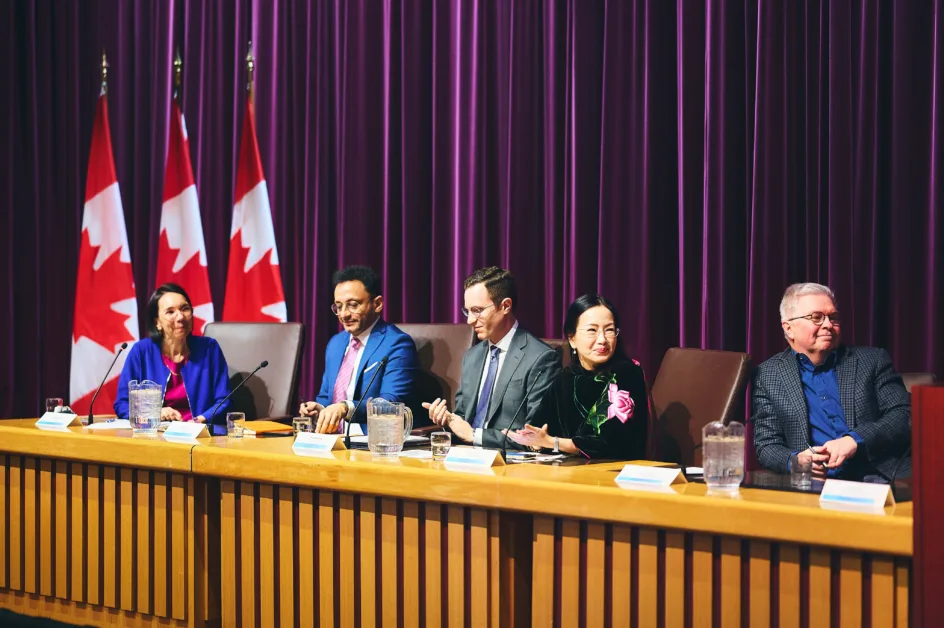
After the keynote address, a panel discussion, moderated by Odette McCarthy, Executive Director of Equitas and member of Cooperation Canada’s Executive Board, highlighted the interconnectedness of the IPS’ five strategic objectives. Vincent Rigby, Slater Family Professor of Practice at Max Bell School of Public Policy at McGill University, shared some thoughts on peace and security, stressing that stability in the Indo-Pacific is essential to global stability and that Canada may be challenged to sustain a meaningful presence in a region with numerous security hotspots. Trevor Kennedy, Vice President, Trade and International Policy, Business Council Canada, speaking to the second IPS strategic objective to expand trade, investment and supply chain resilience, stressed the opportunities that the Indo-Pacific region offers for Canadian businesses. A solidarity perspective was brought by Emrul Hasan, Vice President, Global Programs, CARE Canada, who emphasized how civil society organizations foster connections and partnerships between people by investing in women empowerment and poverty alleviation programs. Representing the Association of Southeast Asian Nations (ASEAN) Diplomats in Canada, Dr. Quynh Tran, Head of Trade Office at the Embassy of Vietnam, made important connections between human rights, corporate accountability, and environmental sustainability, all important considerations for Canadian and ASEAN companies. Speaking to the fifth strategic objective of the IPS, Canada as an active and engaged partner to the Indo-Pacific, Dr. A.W. Lee, Director of Inclusive International Trade, at the Asia Pacific Foundation of Canada, shared some directions that the Foundation is taking to pitch Canada as an opportunity for Indo-Pacific countries, including through enhanced presence in the region.
Following the rich panel discussion, participants had the opportunity to focus on the third IPS strategic objective, that is Investing in and connecting people. They approached this theme in small groups, which allowed for more focused conversations and deeper dives into the linkages between this strategic objective and the other four, i.e. Peace & Security, Trade & Investment, Sustainability and Partnerships.
In her closing remarks, Patricia Peña, Assistant Deputy Minister for International Development Partnerships and Operations at Global Affairs Canada, restated the importance of partnerships for effectively delivering international assistance globally. This is an area where Canadian CSOs have demonstrated and continue to showcase excellence, integrity, and innovation. This is also why Cooperation Canada is committed to continue engaging with Global Affairs on regional strategies and their alignment with Canada’s feminist agenda.
A more extensive consultation report will be released in the coming months and will serve as springboard for the regional consultation tables to be organized later this year by the provincial councils for international cooperation, i.e., Association Québécoise des Organismes de Coopération Internationale (AQOCI), British Columbia Council for International Cooperation (BCCIC), and Ontario Council for International Cooperation (OCIC). So stay tuned!
Cooperation Canada is grateful to many individuals and organizations for supporting this consultation. We would not have been able to do this without you!
Asia Pacific Foundation, Business Council of Canada, Canada-ASEAN Business Council, Canadian Red Cross (CRC), CARE Canada, Embassy of Vietnam in Canada, FinDev, Mennonite Central Committee (MCC), International Justice Mission (IJM), Ontario Council for International Cooperation (OCIC ), The Equality Fund, Trade Facilitation Office Canada (TFO), UPA Développement international (UPA DI), Vincent Rigby, World Accord
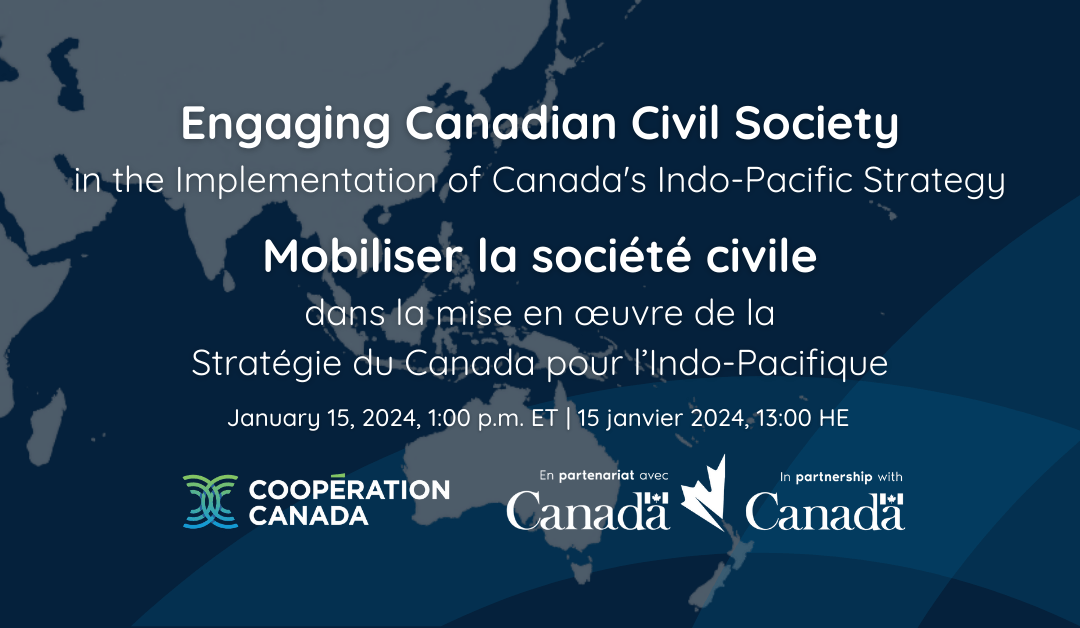
by Cooperation Canada | Dec 6, 2023 | Finance, News
Cooperation Canada, in partnership with Global Affairs Canada, is organizing a public consultation to engage Canadian civil society in implementing Canada’s Indo-Pacific Strategy (IPS) aimed at deepening partnerships at country and regional organization levels in the Indo-Pacific region. Effective CSO engagement is key to a successful IPS implementation, as international assistance is one of its essential components.
The event will raise awareness of the strategy, facilitate dialogue on its implementation, and serve as a springboard for subsequent regional events in Montreal, Toronto, and Vancouver.
Please join us in Ottawa on January 15th, 2024, from 1 to 4:30 pm ET, in person* or online.
*In person registration is capped at 200.
by Cooperation Canada | Aug 17, 2023 | Finance, News
Cooperation Canada partnered on a survey conducted by CanWaCH and the Public Opinion Research Working Group (PORWG), which showed that Canada’s role on the global stage remains a clear priority for Canadians.
The national poll conducted by Abacus Data found that 77 percent of Canadians feel that it’s important to maintain Canada’s history of stepping up and supporting other countries in need, while 81 percent support Canada providing Official Development Assistance (ODA) specifically. This despite 94 percent expressing concern over the rising cost of living in Canada, and 85 percent concerned about housing affordability.
Learn more about the research here.







